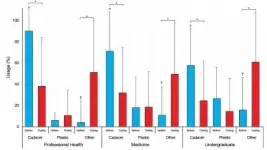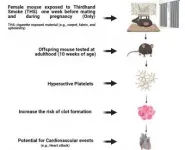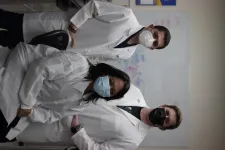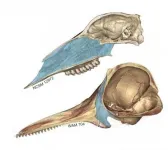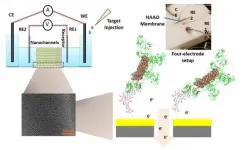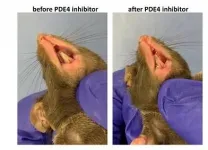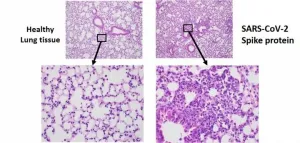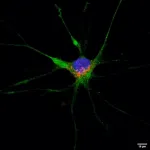(Press-News.org) The antidepression drug duloxetine could be beneficial to patients with both depression and cardiovascular disease, according to new studies performed in human blood and in mice. Globally, more than 300 million people have depression, which comes with an increased risk of developing cardiovascular disease.
When a blood vessel is injured, the platelets in our blood respond by forming clots that stop blood bleeding. If this activation goes into overdrive, it can lead to thrombosis, a condition where blood clots form inside blood vessels and can dislodge to lead to a heart attack or stroke. In the new studies, researchers showed that duloxetine inhibited platelet function and protected against clot formation.
"Understanding the antiplatelet effects of duloxetine is critical due to the prevalence of patients with depression and cardiovascular disease," said Patricia A. Lozano, a research assistant at the Texas A&M University Rangel College of Pharmacy. "Having one drug that can treat both conditions could help avoid drug interactions. Duloxetine may also serve as a blueprint for developing a novel class of antithrombotic agents."
Lozano, who works in the laboratory of Fatima Alshbool, PharmD, PhD, and Fadi Khasawneh, PhD, will present the new research at the END
Depression medication could also protect against heart disease
Researchers show antidepression drug also protects against clot formation in human blood
2021-04-27
ELSE PRESS RELEASES FROM THIS DATE:
Five new insights in the fight against COVID-19
2021-04-27
Scientists from around the world are gathering to share the latest research at the forefront of biology during the END ...
Five studies point to dangers of environmental exposures
2021-04-27
Recent years have brought increased attention to the lasting effects of chemicals we unwittingly inhale, touch and ingest while going about our daily lives. The END ...
Gene changes might explain long-haul COVID-19 symptoms
2021-04-27
Results from a new cell study suggest that the SARS-CoV-2 spike protein can bring about long-term gene expression changes. The findings could help explain why some COVID-19 patients -- referred to as COVID long-haulers -- experience symptoms such as shortness of breath and dizziness long after clearing the infection.
SARS-CoV-2, the virus that causes COVID-19, is covered in tiny spike proteins. During infection, the spike proteins bind with receptors on cells in our body, starting a process that allows the virus to release its genetic material into the inside of the healthy cell.
"We found that exposure to the SARS-CoV-2 spike protein alone was enough to change ...
How does a nose evolve into a blowhole? Study suggests there's more than one way
2021-04-27
The two major types of cetaceans appear to have evolved their characteristic blowholes through different anatomical transformations, according to a study being presented at the END ...
Plant compound shows promise against triple-negative breast cancer
2021-04-27
Findings from a new cell study suggest that the natural plant compound sanguinarine could be a promising tool for targeting triple-negative breast cancer cells. The researchers also found that breast cancer cells derived from people with African American ancestry were more sensitive to sanguinarine than those of European origin.
"Triple negative breast cancer is especially aggressive in African American women, who are also more likely to develop this type of breast cancer than women of European descent," said Samia Messeha, PhD, a research associate in the College of Pharmacy and Pharmaceutical Science at Florida Agricultural and Mechanical ...
Researchers design sensor for fast, inexpensive on-site Ebola detection
2021-04-27
Researchers are developing a new sensor that can detect Ebola in a single drop of blood and provides results in just an hour. With further development, the technology might also enable fast and inexpensive detection of other viruses, including the virus that causes COVID-19.
Ebola is one of the deadliest of all known viruses, killing up to 90% of those infected. Stopping its spread requires quickly detecting and isolating infected people. However, outbreaks tend to occur in remote areas of Africa, requiring blood tests to be transported to distant laboratories for analysis. This leads to significant delays in identifying a new outbreak.
Soma Banerjee, PhD, a visiting scientist in Marit Nilsen-Hamilton's laboratory at Iowa State ...
Researchers uncover potential new way to treat dry mouth
2021-04-27
Researchers studying mice made a serendipitous discovery that could lead to a new dry mouth treatment. More than 10% of people experience dry mouth, which can be caused by medical conditions, radiation treatment, certain medications and aging.
Abigail Boyd, a doctoral candidate at the University of South Alabama, and colleagues made the new discovery while exploring the anti-inflammatory benefits of inhibiting phosphodiesterase-4 (PDE4) enzymes in a mouse model of bacterial lung infection. After noticing that mice treated with a PDE4 inhibitor were salivating, they decided to examine whether this observation could be translated into a dry mouth therapy. They ...
SARS-CoV-2 spike protein alone may cause lung damage
2021-04-27
Using a newly developed mouse model of acute lung injury, researchers found that exposure to the SARS-CoV-2 spike protein alone was enough to induce COVID-19-like symptoms including severe inflammation of the lungs.
SARS-CoV-2, the virus that causes COVID-19, is covered in tiny spike proteins. These proteins bind with receptors on our cells, starting a process that allows the virus to release its genetic material into a healthy cell.
"Our findings show that the SARS-CoV2 spike protein causes lung injury even without the presence of intact virus," said Pavel Solopov, PhD, DVM, research assistant professor at the Frank Reidy Research Center for Bioelectrics at Old Dominion University. "This previously unknown mechanism could cause symptoms before substantial viral replication ...
'Smart shirt' takes a trip to space for science
2021-04-27
A technology-packed tank top offers a simple, effective way to track astronauts' vital signs and physiological changes during spaceflight, according to research being presented at the END ...
Study illuminates how COVID-19 worms its way into the brain
2021-04-27
New research offers an up-close view of how SARS-CoV-2, the virus that causes COVID-19, can spread to the brain. The study helps explain the alarming array of neurological symptoms reported in some patients with COVID-19, as well as why some patients suffer severe neurological effects while others experience none at all.
The researchers report evidence that SARS-CoV-2 can infect both the nerve cells that power our brains (neurons), and the cells in the brain and spinal cord that support and protect neurons (astrocytes).
"Our findings suggest that astrocytes are a pathway through which COVID-19 causes neurological damage," said Ricardo Costa, PhD, a postdoctoral fellow at the ...
LAST 30 PRESS RELEASES:
New book captures hidden toll of immigration enforcement on families
New record: Laser cuts bone deeper than before
Heart attack deaths rose between 2011 and 2022 among adults younger than age 55
Will melting glaciers slow climate change? A prevailing theory is on shaky ground
New treatment may dramatically improve survival for those with deadly brain cancer
Here we grow: chondrocytes’ behavior reveals novel targets for bone growth disorders
Leaping puddles create new rules for water physics
Scientists identify key protein that stops malaria parasite growth
Wildfire smoke linked to rise in violent assaults, new 11-year study finds
New technology could use sunlight to break down ‘forever chemicals’
Green hydrogen without forever chemicals and iridium
Billion-DKK grant for research in green transformation of the built environment
For solar power to truly provide affordable energy access, we need to deploy it better
Middle-aged men are most vulnerable to faster aging due to ‘forever chemicals’
Starving cancer: Nutrient deprivation effects on synovial sarcoma
Speaking from the heart: Study identifies key concerns of parenting with an early-onset cardiovascular condition
From the Late Bronze Age to today - Old Irish Goat carries 3,000 years of Irish history
Emerging class of antibiotics to tackle global tuberculosis crisis
Researchers create distortion-resistant energy materials to improve lithium-ion batteries
Scientists create the most detailed molecular map to date of the developing Down syndrome brain
Nutrient uptake gets to the root of roots
Aspirin not a quick fix for preventing bowel cancer
HPV vaccination provides “sustained protection” against cervical cancer
Many post-authorization studies fail to comply with public disclosure rules
GLP-1 drugs combined with healthy lifestyle habits linked with reduced cardiovascular risk among diabetes patients
Solved: New analysis of Apollo Moon samples finally settles debate about lunar magnetic field
University of Birmingham to host national computing center
Play nicely: Children who are not friends connect better through play when given a goal
Surviving the extreme temperatures of the climate crisis calls for a revolution in home and building design
The wild can be ‘death trap’ for rescued animals
[Press-News.org] Depression medication could also protect against heart diseaseResearchers show antidepression drug also protects against clot formation in human blood

